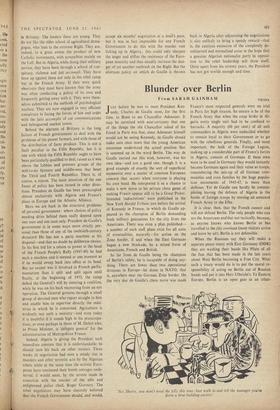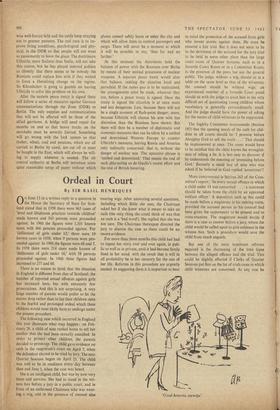Blunder over Berlin
From SARAH GAINHAM
VIENNA
T UST before he was to meet President Ken- J nedy, Charles de Gaulle went, for the first time, to Bonn to see Chancellor Adenauer. It may be surmised with near-certainty that one of the things the old Chancellor asked of his friend in Paris was that, since Adenauer himself would not be seeing Kennedy, de Gaulle should make sure once more that the young American statesman understood the actual position that is summed up in the word Berlin. The way de Gaulle carried out this wish, however, was his own idea—and not a good one, though it is a good example of exactly the sort of superficial manoeuvre over a matter of common European concern that occurs when everyone is playing his own hand. He interpreted it as a chance to make a new move in his private chess game of making France appear still to be a Great Power. Intended 'indiscretions' were published in the New York Herald Tribune just before the arrival of Kennedy in France, in which de Gaulle ap- peared as the champion of Berlin demanding fresh military guarantees for the city from the Americans. There was even a plan published— a number of such staff plans exist for all sorts of eventualities, naturally—for action on the Zone border, if and when the East Germans began a new blockade, by a mixed force of Americans, French and British.
So far from de Gaulle being the champion of Berlin's safety, he is incapable of doing any- thing. There are fewer than two operational divisions in Europe—let alone in NATO; that is, anywhere near the German Zone border. On the very day de Gaulle's chess move was made France's most respected generals were on trial in Paris for high treason. So unsure is he of the French Army that when the coup broke in Al- geria every single unit had to be confined to barracks. A majority (60 per cent.) of all unit commanders in Algeria were undecided whether to remain loyal to their Government or to go with the rebellious generals. Finally, and most important, the bulk of the Foreign Legion, making up a considerable part of France's forces in Algeria, consists of Germans. If these men were to be used in Germany they would instantly become Germans again and their value as troops, remembering the mix-up of all German com- munities and even families by the huge popula- tion movements of 1945-47, is more than dubious. Yet de Gaulle can hardly be contem- plating leaving the defence of Algeria in the hands of foreign troops by moving an unmixed French Army to the Elbe.
It is clear, then, that the French cannot and will not defend Berlin. The only people who can are the Americans and that not tactically, because, as anyone knows who knows Berlin or has travelled to the city overland (most visitors arrive and leave by air), Berlin is not defensible.
When the Russians say they will make a separate peace treaty with East Germany (DDR) they are washing their hands like Pilate of all the fuss that has been made in the last years about West Berlin becoming a Free City. What such a treaty would do is to put the moral re- sponsibility of acting on Berlin out of Russian hands and put it into Herr Ulbricht's. To Eastern Europe, Berlin is an open gate in an other- 'No, Shorty, you won't need du' jelly this time. Just walk in and tell the manager you're from a bent building society.'
wise well-fenced field and the cattle keep straying out to greener pastures. The real cure is to im- prove living conditions, psychological and phy- sical, in the DDR so that people will not want so passionately to leave the place. The doctrinaire Ulbricht, more Stalinist than Stalin, will not take this course, but he has played internal politics so cleverly that there seems to be nobody the Russians could replace him with if they wished to force a liberalising change on the regime. So Khrushchev is going to gamble on leaving Ulbricht to solve this problem on his own.
After the eastern peace treaty is signed there will follow a series of measures against German communications through the Zone (DDR) to Berlin. The only supplies and communications that will not be affected will be those of the allied garrisons. A bridge will need repair for months on end so that heavy trucks on the autobahn must be severely limited. Something will go wrong with the lock system so that timber, wheat, coal and potatoes, which are all carried to Berlin by canal, are cut off or must be bought in the East, which will always be will- ing to supply whatever is needed. The air control authority at Berlin will introduce some quite reasonable scrap of paper without which
planes cannot safely leave or enter the city and which will allow them to control passengers and cargo. There will never be a moment at which it will be possible to say, 'thus far and no farther.'
At this moment the Americans hold the balance of power with the Russians over Berlin by means of their mutual possession of nuclear weapons. A separate peace treaty would alter that balance, making the situation local and parochial. If the status quo is to be maintained, the arrangements must be made, whatever they are, before a peace treaty is signed. Once the treaty is signed the situation is at once more and less dangerous. Less, because there will not be a single moment of flash-point danger; more, because Ulbricht will chance his arm with less discretion than the Russians have shown. But there will then be a number of diplomatic and economic measures that can be taken by a unified and determined Western Europe to counter Ulbricht's measures, leaving Russia and America only indirectly concerned; that is, without the danger of nuclear war. The operative phrase is 'unified and determined.' That means the end of such play-acting as de Gaulle's recent effort and the end of British havering.



































 Previous page
Previous page